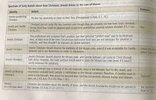RobertPGH1981
Puritan Board Sophomore
In my ESV Study bible under Chapter 2 it outlines what it calls "Spectrum of Early Beliefs about How Christians Should Relate to the Law of Moses". I suppose when the study bible refers to the law of Moses it really is focused on the Ceremonial Law (ie. Circumcision, Burnt Offering). I recognize that not all Christians view a tripartite division of the law but traditional Covenant Theology does. This is a topic that I am continuing to learn but wanted everyone's understanding.
The Covenant of Grace threads through the entire Old Testament and it comes to fruition in the New Covenant. Many in reformed circles speak of the New Covenant as a renewal of a covenant under a different dispensation/administration. The diagram below equates this view to that of a Judaizer. Am I misunderstanding the perspective or are we dealing with a biased perspective in the ESV Study bible. Here is a screenshot of the table under Gal 2. It seems like the covenantal renewal view is different in this chart than what would be found in traditional covenant theology.

The Covenant of Grace threads through the entire Old Testament and it comes to fruition in the New Covenant. Many in reformed circles speak of the New Covenant as a renewal of a covenant under a different dispensation/administration. The diagram below equates this view to that of a Judaizer. Am I misunderstanding the perspective or are we dealing with a biased perspective in the ESV Study bible. Here is a screenshot of the table under Gal 2. It seems like the covenantal renewal view is different in this chart than what would be found in traditional covenant theology.


